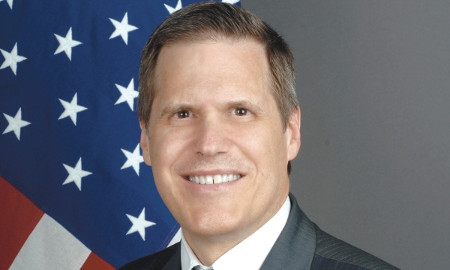Cordial, deep-rooted and mutually advantageous – however you describe relations between the U.S. and Kuwait, it is clear they are in excellent working order. And how could it be otherwise, given that the two countries have more interests in common than most people realize? The U.S. Ambassador to Kuwait, Matthew Tueller, is clear on that point.
“As diplomats and citizens we always feel very welcome here and not just since 1991, though that has given a particular energy to the relationship. There is a long history of U.S. engagement in security, economics, healthcare and the education sector.”
Mr. Tueller notes that the 1990-91 Iraqi invasion was not the first time the allies found themselves united in common cause. During the Iran-Iraq war, Washington had allowed Kuwait to reflag its oil tankers and be escorted by American warships when mine warfare threatened to cut off Gulf oil exports. Before that had been years of trade and investment, when U.S. firms played a key part in developing the petroleum and energy sectors.
In the aftermath of the Iraqi invasion, a bilateral defense pact enshrines Washington’s pledge to assist Kuwait if its security and integrity should again come under threat. As Kuwait is amply capable of funding its defense hardware needs, the training and upgrading of Kuwaiti personnel has become a critical element in regional security architecture.
For its part, Washington can count on a secure temporary base should it be called upon to project its military power into the northern Gulf area.
“There really is a unique relationship between Kuwait and the U.S., and it has been good for both,” Ambassador Tueller states emphatically.
Also, many Kuwaitis go stateside for advanced medical treatment that their public health system is currently unable to offer them. “So in addition to the number of visas that we issue to Kuwaitis for study, tourism, or for business, there is a significant number that still go for medical care,” the Ambassador confirms. “Sometimes at the expense of the Kuwaiti government. Other times it’s Kuwaitis themselves who prefer to go to the best medical institutions in the United States.
“We have been seeing increasing interest on the part of the Kuwaiti government in advancing their own capability to the next stage by reaching out to U.S. health providers. In December, we witnessed the signing of an agreement whereby Johns Hopkins will provide both clinical and management consultancy services to four specialist hospitals in Kuwait, in a deal valued at nearly $350 million.”
One thing you might not suspect the United States and Kuwait to have in common is an extremely high incidence of diabetes, with up to 25% of their respective populations estimated as pre-diabetic.
The U.S. experience with public health initiatives has been a useful lesson to Kuwaiti authorities in devising joint research projects and campaigns aimed at heightening awareness of the issue and of the changes in diet and exercise that could prevent it.
Another important source of goodwill, the ambassador adds, arises from the fact that so many Kuwaitis have taken the opportunity to go to the United States to study, and returned with a generally favorable and lasting impression of the country.
“A degree from a U.S. institution remains the gold standard,” Mr. Tueller points out. “Kuwaitis who have received an education in the U.S. are regarded as having skills, contacts and a professionalism that is of great value to this country. And it continues to this day.”
Being favorably disposed towards the United States has likewise helped Kuwait become a major customer for U.S. exports. Its goods and services are highly valued and recognized for their high quality, whether it is the family restaurants you seen in malls, or automobiles on the street, according to the U.S. envoy.
“The areas in which Kuwait looks to push forward more aggressively are in terms of developing more infrastructure, whether in roads, hospitals, schools, electricity generation, or water treatment. We believe the U.S. companies that have played an important role in past development initiatives will also be successful bidders on contracts.
“I mention that because I think it is indicative of how Kuwait is somewhat unique here among the Gulf countries. It tends to be more outward looking, more tolerant, and more welcoming of foreigners. And that, I think, gives a particular strength to Kuwait and is a consistent theme that you find throughout its history.”

0 COMMENTS